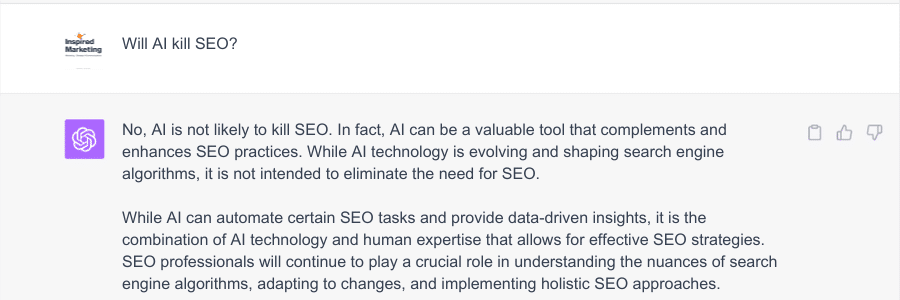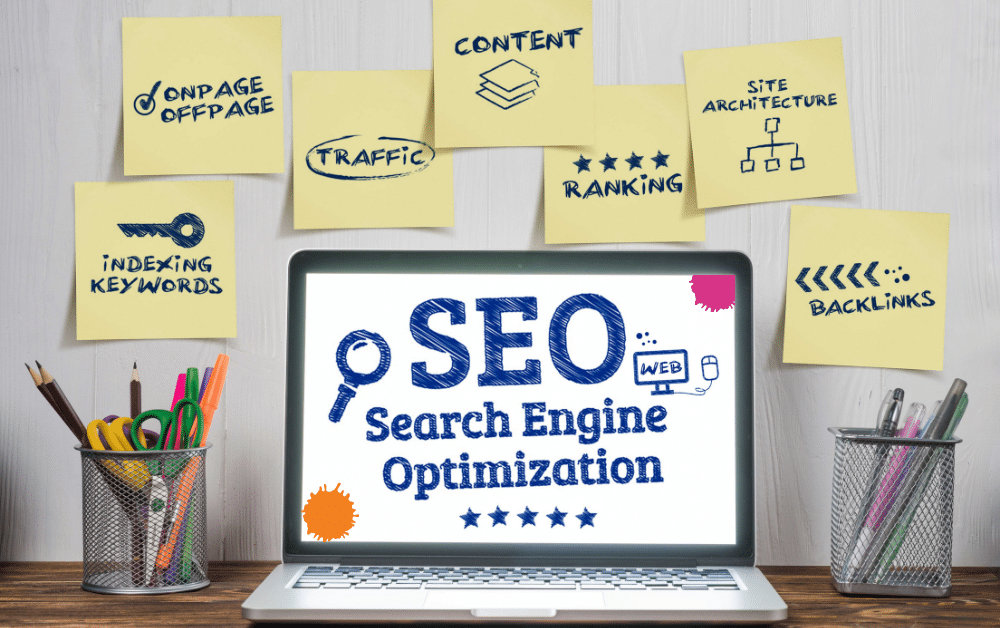Like paper books, James Bond and 90’s rock, Search Engine Optimization has survived all the death dates prescribed by its naysayers, reinventing itself as the internet itself evolves.
The fundamentals haven’t changed: to be visible online, a website needs to be technically sound, easy to use and navigate (on all devices), and meet all of Google’s metrics for what counts as “optimized”.
Once all of that is in place, your brand needs a great content strategy, a key element to success in gaining organic traffic. And Google is becoming better at separating the genuinely good wheat from the thoughtless, AI copy-paste chaff.
Getting good content in the right channels, at the right time (and in front of the right people) is even more important than it’s ever been. This is especially true for B2B tech companies, for reasons we’ll be exploring in this article.
We’ll also be outlining the essential elements of a B2B SEO strategy, and what tech companies in particular need to be doing to capture relevant search intent, boost visibility, and ultimately increase conversion rates.
Why B2B Tech Companies Need a Strong SEO Strategy
Before we get there, it’s worth considering why SEO is still relevant – crucial, even – in an era of rapid change defined by AI.
It’s a story every digital marketer has seen unfold many times:
- A new technology emerges, revolutionizing the internet (in this case, AI language models)
- Marketers, sensing a change, begin sounding the alarm
- A flurry of articles proclaims the death of business-as-usual (in this case, SEO)
The end is always the same: the way people search for information changes, and businesses adapt accordingly. Marketers help them to optimize their online presence to be more visible in the new normal.
And that optimization plays out, inevitably, as organic search results on search engines, AI or no AI.
But just to be sure, we asked ChatGPT:

So, SEO remains a vital component of any business marketing strategy. But it’s difficult to get it right – especially for B2B companies. Every step takes specialized expertise, from strategy to the crafting of content that people actually want to read.
It’s also something that requires long-term vision, because the benefits accrue over time.
And they only accrue at all if the foundational elements are in place. If you’d like to cut to the chase and start building a strong, future-ready SEO strategy, you’re just a click away:

Three legs of a winning B2B SEO strategy: on-page, technical & off-page
A search engine optimization strategy is the set of actions a business takes to rank higher on search engines and attract more organic (free) traffic.
One of the primary mechanisms marketers use to achieve this is targeting keywords or search terms that feature prominently in a particular market. They optimize content, meta tags, keyword usage and internal linking to make pages more visible and more informative for users. Because this takes place on web pages, marketers call this on-page SEO.
Another goal for SEO specialists is to improve the performance of websites and website infrastructure, to improve the user experience and increase user engagement. This is commonly referred to as technical SEO.
Still more optimization can take place outside of a website itself. These “off-page SEO” activities include activities like link building, social media engagement and online mentions that boost a website’s authority and reputation.
Feeding the algorithm: Expertise, Authority, Trustworthiness
Taken together, these each play a role in building a thriving online presence for a brand. When that online presence is optimized, search engines like Google reward it with traffic. Google recognizes domains that demonstrate Expertise, Authority and Trustworthiness, the EAT formula for success. Unless your digital shopfront satisfies these criteria, it will fail to attract the right attention.
And given that B2B buyers and buying groups spend more than a quarter of their time researching suppliers online – long before they even make first contact – that online shopfront is critical to success.
Why SEO is more complex for B2B tech companies
For B2C brands, SEO relies on volume. Marketers plug into a large number of high-volume keywords to generate large volumes of traffic to move down the funnel. Customers begin at the top (I have a problem) through the middle (I’m looking for a solution) and to the bottom (I’m convinced that your solution is the best).
B2B selling is completely different – and more complicated – for a number of reasons you’re probably already familiar with.
B2B buyers go through (much) longer sales cycles
B2B tech sales cycles are much longer than B2C, averaging anywhere between 1 to 6 months. They also move between stages of the funnel, rather than proceeding in a straightforward top-to-bottom line. That’s because purchasing decisions typically lie with groups, rather than individuals. And these groups include highly knowledgeable people with very specific needs.
Before any of these people can become leads and potential buyers, they will spend a great deal of time online. Only those tech companies with a robust online presence will get into their horizons – and from there, into the shortlist of vendors receiving serious consideration.
Keywords are low-volume and laser-focused
Because of these specific needs, B2B buyers also follow particular terms that are relevant to their industry and their business challenges. B2B SEO specialists need to know what those terms are, and optimize content around them. Typically, they’re relatively low in search volume, which means there’s very little margin for error.
Where B2C marketing favors quantity, B2B favors precision – and traffic only has value if it matches the offering. Getting this wrong means wasting time and resources. A business may attract a large quantity of traffic, but if it’s not the right traffic, all this will yield is a high bounce rate.
The problem is that it’s very easy to get it wrong.
The wrong keywords means missed opportunities
Take, for example, a B2B tech company that provides a platform for hiring and paying remote-working personnel. Buyers for this product include HR managers and tech procurement heads at large corporations.
As part of its SEO strategy, the company decides to target “procurement” as a keyword on its website, in blog content, and across social media. This seems reasonable, but let’s take a look at how search engines construe this word:

This isn’t looking like a good starting point, for a couple of reasons. Firstly, while there’s high search volume, there’s also extreme keyword difficulty. The search intent is also largely informational (rather than commercial), which means the juice probably won’t be worth the squeeze (at least not right now). That’s not to mention the semantics: “procurement” will attract a ton of search intent from logistics and supply chain – and that’s the wrong audience.
Now let’s refine it with “Saas” to try to zero in on people who are actively looking for a tech tool.

On the surface, this looks worse (only 110 searches a month!). But it’s actually much better.
The keywords you want to target as a B2B tech business are almost always low in search volume, because the problems you’re solving are pretty niche. This particular one has a low difficulty score, too, which means that your SEO efforts could start yielding results quicker. We can also see definite commercial intent in this result – people are looking to buy.
Now we’re getting somewhere, and we can start to reach this smaller, actual target audience – the one we actually need to be talking to (think “big fish in small pond” rather than the reverse).
Small tweaks like these can yield dramatic results. Specialists use specialized SEO tools for B2B markets in order to define buyer personas and pinpoint the keywords they care about most.
B2B buyers really care about thought leadership
It’s not just B2B buyers’ behavior and interests that sets them apart. The type of content they consume – and the way they consume it – also differs. As we said earlier, they’re slower to buy, and they have a highly specified picture of what it is that they’re looking for. Creating content that is aligned with this buying behavior is critical.
Thought leadership is one of the primary heuristics they rely on to identify the solutions that best match this picture:
- Long-form original content focused on relevant issues
- PR, webinars and public appearances with industry thought leaders
- Blog posts and guest posts
- LinkedIn and social media marketing
As the engine of a B2B SEO strategy, authentic thought leadership is indispensable for any tech companies seeking to set themselves apart in what are usually small, niche markets.
Like all the other aspects of SEO that we’ve discussed here, thought leadership is a long-term strategy that pays dividends over time, and there are no shortcuts. Buyers only become more discerning as time passes, raising the bar for thought leadership that stands out as expert, authoritative and trustworthy.
Inspiring audiences with leading B2B SEO solutions
The Inspired Marketing team supports leading tech brands seeking to expand their influence in B2B markets and maximize the value of their marketing budgets.
Our expert team builds and implements effective SEO strategies, backed by multi-disciplinary technical expertise in all aspects of SEO and content marketing. Our dynamic and forward-thinking approach accounts for changes in search engine algorithms and the constantly evolving landscape within each niche of the B2B tech landscape, yielding reliable results for companies that need to move fast.
Contact us today to learn more about working with Inspired Marketing as your strategic B2B SEO partner.



